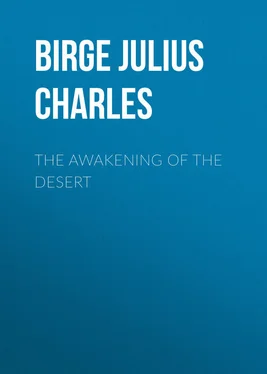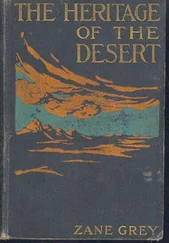Julius Birge - The Awakening of the Desert
Здесь есть возможность читать онлайн «Julius Birge - The Awakening of the Desert» — ознакомительный отрывок электронной книги совершенно бесплатно, а после прочтения отрывка купить полную версию. В некоторых случаях можно слушать аудио, скачать через торрент в формате fb2 и присутствует краткое содержание. Жанр: foreign_language, foreign_antique, foreign_prose, на английском языке. Описание произведения, (предисловие) а так же отзывы посетителей доступны на портале библиотеки ЛибКат.
- Название:The Awakening of the Desert
- Автор:
- Жанр:
- Год:неизвестен
- ISBN:нет данных
- Рейтинг книги:5 / 5. Голосов: 1
-
Избранное:Добавить в избранное
- Отзывы:
-
Ваша оценка:
- 100
- 1
- 2
- 3
- 4
- 5
The Awakening of the Desert: краткое содержание, описание и аннотация
Предлагаем к чтению аннотацию, описание, краткое содержание или предисловие (зависит от того, что написал сам автор книги «The Awakening of the Desert»). Если вы не нашли необходимую информацию о книге — напишите в комментариях, мы постараемся отыскать её.
The Awakening of the Desert — читать онлайн ознакомительный отрывок
Ниже представлен текст книги, разбитый по страницам. Система сохранения места последней прочитанной страницы, позволяет с удобством читать онлайн бесплатно книгу «The Awakening of the Desert», без необходимости каждый раз заново искать на чём Вы остановились. Поставьте закладку, и сможете в любой момент перейти на страницу, на которой закончили чтение.
Интервал:
Закладка:
"Now, Cap," said one, "you are getting right down to the philosophy of Sabbath observance. Why can you drive farther by resting full days rather than to rest your stock a little more each day?"
"Well, I don't know, except that I have tried both ways. Animals and men seem to be built that way. Now, here's these Seventh Day Baptists whose Sunday comes on Saturday. They're all right, but they would be just as correct if they would regularly use any other day as the Sabbath, and I believe the Lord knew what we ought to have when he got out the fourth commandment. I know 'em all as well as you do. I think Mrs. Whitmore is right in going to church on Sunday, and in making me put on a clean shirt when at home, even though I do not go with her. It would be better for me if I would go with her, but I have roughed it so much that I have got out of the way of it."
Thus was announced the Captain's policy for our quasi weekly days of rest, and the affair was conducted accordingly.
As our train crawled across Rock River, whose banks were once the favorite hunting grounds of the Winnebagoes and Pottawattamies, I recalled a final gathering of the remnant of the latter tribe, which I witnessed, when, for the last time, they turned from their beautiful home and started in single file on their long, sad trail toward the setting sun, to the reservation set apart for them forever. We shall note more of this type of historical incident as we pass beyond the Missouri, for the white man was pushing the Indian year by year farther back into the wild and arid lands then supposed to be of no use for cultivation.
The overshadowing events of more recent years cause us almost to forget that Zachary Taylor, Winfield Scott, Jefferson Davis, Abraham Lincoln, Robert Anderson of Fort Sumter fame, and other men who became distinguished in American affairs, were once engaged in pursuing the Sacs and Foxes up these streams which we crossed while on our journey to the land of the yet unsubdued Sioux and Cheyennes.
Passing beyond the Mississippi, and to the western limit of railroad transportation, I was joined at Monticello by my old friends, Ben Frees and Fred Day.
Walking back six miles from the frontier station we struck the camp in time for a late supper. The dark evening hours were brightened by a rousing bonfire that the boys had built. The shadows of night had long since settled down upon the camp, and, there being no apparent occasion for us to retire immediately, Ben, Fred and I wandered together out into the gloom far away from the now flickering camp fire, which like some fevered lives, was soon to leave nothing but gray ashes or blackened, dying embers. We had just come together after our separation, and we conversed long concerning the unknown future that lay before us, for no definite plans for our trip, nor even the route that we were to take, had been perfected, and this was the second of May.
Our footsteps led us toward a rural cemetery, some miles east of the town of Monticello, in which we had already observed a few white grave stones, indicating that the grim reaper had found an early harvest in this new settlement. Our attention was soon attracted to a dim light slowly floating around the ground in a remote ravine within the enclosure. A lonely graveyard at night had never appealed to me as a place of especial interest, yet I had heard of one unfortunate, who in his natural life had done a great wrong; when consigned to the tomb, his spirit, unable to rise, was held to earth, and yearly on certain nights it hovered over the grave where his own body had gone to dust.
"Boys," said Fred, "that light is certainly mysterious; it is not the light of a candle." A slight chill ran up my spinal column, concerning which I made no comment. It was at once suggested that there was nothing we were able to do about it; moreover our diffidence and modesty naturally inclined us to avoid mixing up in the private, sub-mundane affairs of the departed, especially those with whom we had had no acquaintance, or whose character was uncertain. If, instead of this strange light, the appearance had been something of flesh and blood, we, being as we believed, quite courageous, would have proceeded at once to investigate its nature. Curiosity, however, led us to advance cautiously forward. Ben, being a trifle shorter than I, was permitted to move in advance, as I did not wish to obstruct his view. The phosphorescence, or whatever it was, soon ceased to move, and rested near a little gravestone, the form of which we could faintly discern in outline. Quietly drawing nearer, we caught the subdued sound of something like a human voice coming, as we believed (and as was truly the fact), from the earth; the words, as nearly as we could understand, were, "help me out." Surely this was a spirit struggling to escape, and our approach was recognized. At that moment we were startled to discover an arm reaching upward from the earth. Another dark form, emerging from the shadow of a nearby copse of bushes, in the dim light could be seen approaching toward the extended hand, which it appeared to grasp, and a body was lifted to the surface, from which came the words of kind assurance, "It's all right, Mike." "Sure," said Ben, "that is an Irishman, and I think Irishmen are generally good fellows, but I believe they are robbing a grave."
Drawing still nearer we discovered that the light which we had observed was an old-fashioned tin lantern, suspended from a small tree, and its feeble rays now brought to our view a plain, wooden coffin resting upon the ground. Inspired by a better knowledge of the situation, we quickly came to the front, and, as if vested with some authority for inquiring concerning this desecration, we demanded an explanation, for it was now past midnight.
"And wad ye have all the facts?" asked the Irishman, as we looked into the open grave. We firmly urged that we must understand the whole situation. The two men glanced at each other. "Well," said one, "this man in this coffin ferninst ye, died last night of smallpox, and we were hired to bury him before morning, because ye wouldn't have a smallpox stiff around in the day time, wad ye?" The path out of the graveyard was tortuous and dark; in fact, we found no path through the dense underbrush, but we reached the road in safety. Unseen and immaterial things are usually more feared than are visible and tangible objects. The combination of smallpox and spirits departed verges visibly on the uncanny.
On a tributary of the Des Moines River we found the first Indians thus far seen, possibly two score of miserable, degraded beings who were camping there. They had little of the free, dignified bearing of representatives of the tribes with which I had once been familiar. A little contact with civilization and a little support from the Government had made them the idle, aimless wanderers that nearly all savages become when under such influence. Keokuk, the successor of Black Hawk, and Wapello, became chiefs of the united tribes of the Sacs and Foxes, and along with Appanoose, a Fox chief, received reservations along these streams. Wapello was buried at Indian Agency near Ottutumwa, beside the body of his friend and protector, General Street.
Our men had not yet reached a state of savagery in which there was not occasional longing for the good things commonly enjoyed by civilized beings. Among these was milk. On the day that we met the Indians, and at some distance from the camp, a solitary cow was seen feeding on the prairie. Several days had passed since our men had been permitted to enjoy the luxury of milk for coffee. It occurred to Brant that a golden opportunity was presented, which if seized upon would place the camp under lasting obligations to him. He struck across the country and gradually approaching the animal succeeded so thoroughly in securing her confidence that he soon returned with a pail of the precious liquid. The question arose as to whether or not Brant could set up a valid defense against a charge of larceny in case the owner of the cow, having proof that he had extracted the milk, should prefer charges against him. The case was argued at the evening session, and I preserved a record of the proceedings. Evidence was adduced to show that at the time the milk was taken, the cow was feeding upon the public domain, or what is known as Government land; that the grass and water which were taken for its support and nourishment were obtained by the said cow from public lands without payment therefor; that a portion of said grass taken by said cow and not required for nourishment did, through the processes of nature, become milk; that the said milk at the time of its extraction had not become either constructively or prospectively an essential part of said cow, nor could any title thereto become exclusively vested in the owner of said cow, except such milk as said cow should have within her when she should enter upon the premises of her owner. It was admitted that the milk was obtained from said cow under false pretences, by virtue of the fact that Brant's manner in approaching her was such as was calculated to cause any cow of ordinary intelligence to believe that he was duly authorized to take said milk. It was assumed, however, that under the statutes of Iowa there was no law by which said cow could become a plaintiff in a case, even through the intervention of a nearest friend.
Читать дальшеИнтервал:
Закладка:
Похожие книги на «The Awakening of the Desert»
Представляем Вашему вниманию похожие книги на «The Awakening of the Desert» списком для выбора. Мы отобрали схожую по названию и смыслу литературу в надежде предоставить читателям больше вариантов отыскать новые, интересные, ещё непрочитанные произведения.
Обсуждение, отзывы о книге «The Awakening of the Desert» и просто собственные мнения читателей. Оставьте ваши комментарии, напишите, что Вы думаете о произведении, его смысле или главных героях. Укажите что конкретно понравилось, а что нет, и почему Вы так считаете.











